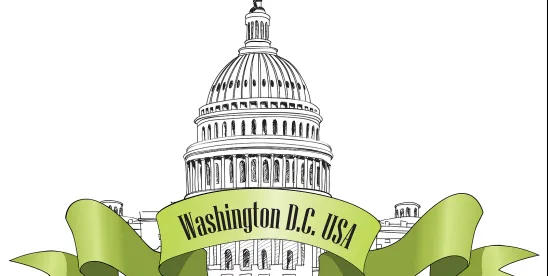THIS WEEK’S DOSE
- Fiscal year deadline approaches. The House Appropriations Committee advanced the Labor, Health and Human Services, and Education appropriations bill and completed action on all of its bills this week. The Senate Appropriations Committee delayed progress on its remaining bills, and the White House sent its anomalies list for a continuing resolution.
- House Oversight Subcommittee on Health Care and Financial Services holds hearing on children’s chronic diseases. Republicans highlighted the need for a prevention-focused healthcare system, while Democrats called for increased support for the Supplemental Nutrition Assistance Program, Medicaid, and school meal programs.
- House Energy and Commerce Health Subcommittee advances public health reauthorization bills. The seven bills passed unanimously.
- MAHA Commission releases “Make Our Children Healthy Again” strategy. The Make America Healthy Again (MAHA) Commission’s second report includes more than 120 initiatives to reduce childhood chronic diseases.
- Trump administration announces actions on DTC prescription drug advertising. The administration aims to reduce misleading direct-to-consumer (DTC) advertisements through US Food and Drug Administration actions.
- CMS issues guidance on Medicaid SDPs. The guidance begins implementation of the state-directed payment (SDP) provision of the One Big Beautiful Bill Act, while also hinting at additional SDP limits.
CONGRESS
Fiscal year deadline approaches. The path forward on government funding remains undecided. Republican appropriators are advocating for a continuing resolution (CR) to fund the government through mid-November 2025, with hopes that Congress can make progress on enacting fiscal year (FY) 2026 appropriations bills during that window. However, this week President Trump sent his anomalies list (a list of programs for which the administration wants to change funding levels in a CR, rather than maintaining current levels) to Congress and asked that Congress pass a CR through the end of January 2026. The House Freedom Caucus prefers this CR duration as well.
The year-end expiration of the Affordable Care Act’s enhanced advanced premium tax credits (APTCs) has become a focal point for Democrats in the CR debate. Democrats are urging that any government funding package or CR this month include an APTC extension. Senate Majority Leader Thune (R-SD) stated he does not want to include an APTC extension in a short-term CR but wants a “clean” CR to buy time to address full appropriations bills. The House Freedom Caucus stated that it will not vote in support of any funding bill that includes an extension of the enhanced APTCs. There is a lot still to watch here as the calendar moves toward September 30, and a government shutdown remains a possibility.
While the CR debate is ongoing, the House continued work on its FY 2026 appropriations bills. The House Appropriations Committee advanced the Labor-Health and Human Services (HHS) bill by a party-line vote of 35 – 28. The House bill would provide $108 billion to HHS, while the Senate version would provide $117 billion. The Senate version previously advanced out of committee with bipartisan support. Prospects for the House version being enacted are slim. It remains to be seen whether appropriators and congressional leadership will be able to reach an agreement on a final Labor-HHS bill later this year, or whether the programs in the bill will be funded in a potential longer-term CR.
The House Appropriations Committee adopted eight amendments by voice vote, including one that bars federal funding from supporting the Center for Medicare and Medicaid Innovation Wasteful and Inappropriate Service Reduction (WISeR) Model. Even though the House version of the Labor-HHS bill, including adopted amendments, is unlikely to become law, the amendments give stakeholders insight into legislators’ priorities and could reappear before an authorizing committee in a freestanding bill or as an amendment on the House floor.
The House also passed a motion to go to conference with the Senate to finalize the three funding bills that have already passed the Senate and/or House:
- Military Construction-Veterans Affairs.
- Agriculture-US Food and Drug Administration (FDA).
- Legislative Branch.
The goal is to either attach those full funding bills to any forthcoming CR, which would cover the remaining federal agencies, or finalize the bills as their own package, so that the relevant agencies are funded for FY 2026.
House Oversight Subcommittee on Health Care and Financial Services holds hearing on children’s chronic diseases. During the hearing, Republicans emphasized the need for a preventive healthcare system focused on reducing childhood obesity by improving nutrition, encouraging physical activity, and reforming federal food assistance programs to limit ultra-processed foods. Democrats focused on protecting and expanding access to the Supplemental Nutrition Assistance Program, Medicaid, and school meal programs, while warning against HHS leadership failures and vaccine misinformation.
The government witnesses included Dorothy Fink, MD, acting assistant secretary for health at HHS, and Eve Stoody, PhD, director of the Nutrition Guidance and Analysis Division at the US Department of Agriculture. They emphasized the need to shift from a reactive to a preventive healthcare model, and defended the scientific integrity of dietary guidelines and the importance of evidence-based policies.
House Energy and Commerce Health Subcommittee advances public health reauthorization bills. During the markup, the subcommittee passed seven bills unanimously:
- H.R. 4262, to reauthorize programs related to health professions education, and for other purposes.
- H.R. 3593, the Title VIII Nursing Workforce Reauthorization Act of 2025.
- H.R. 2493, the Improving Care in Rural America Reauthorization Act of 2025.
- H.R. 3419, to amend the Public Health Service Act to reauthorize the telehealth network and telehealth resource centers grant programs.
- H.R. 3302, the Healthy Start Reauthorization Act of 2025.
- H.R. 2846, to amend Title II of the Public Health Service Act to include as an additional right or privilege of commissioned officers of the Public Health Service (and their beneficiaries) certain leave provided under Title 10, US Code, to commissioned officers of the Army (or their beneficiaries).
- H.R. 4709, the Newborn Screening Saves Lives Reauthorization Act of 2025.
The bills now await consideration by the full committee.
ADMINISTRATION
MAHA Commission releases “Make Our Children Healthy Again” strategy. The commission’s first report, released in May 2025, identified drivers of children’s declining mental and physical health, including poor diet, chemical exposure, lack of physical activity, chronic stress, and overmedicalization. The report recommended initiatives to research these issues further. The newly released strategy identifies more than 120 initiatives, including but not limited to the below, that fall under four pillars:
- Advancing research: Instructs the National Institutes of Health to unify multifaceted datasets (electronic health records, claim information, data from wearable devices) into a single privacy-protected infrastructure to streamline chronic disease research and reduce administrative burdens.
- Realigning incentives and systems to drive health outcomes research to drive innovation: Requests the FDA, the US Department of Justice, and the Federal Trade Commission (FTC) to increase enforcement of DTC prescription drug advertising laws by targeting the most harmful violations, including advertisements by social media influencers and telehealth companies.
- Increasing public awareness: Directs the US Department of Agriculture and HHS to launch an education campaign based on the updated dietary guidelines, which are focused on minimizing highly processed foods and prioritizing whole foods.
- Fostering private sector collaboration: Directs HHS to create a MAHA education campaign focused on improving health and fertility through lifestyle changes.
Read the press release here and our Regs & Eggs blog post previewing the strategy here.
Trump administration announces actions on DTC prescription drug advertising. President Trump directed the FDA to increase transparency and accuracy in DTC advertising and enforce existing DTC statutory requirements. In response, the FDA sent letters to pharmaceutical companies instructing them to remove misleading ads. The FDA also will initiate the rulemaking process to close the “adequate provision loophole” that the agency believes some pharmaceutical companies have used to conceal risks in advertisements. These actions coincide with the release of the MAHA strategy, which directs agencies, including the FDA, to increase enforcement of DTC prescription drug advertising laws.
CMS issues guidance on Medicaid SDPs. The preliminary guidance outlines the timeline for, and limits on, the SDP grandfathering period and details next steps for states following passage of the One Big Beautiful Bill Act (OBBBA). The Centers for Medicare & Medicaid Services (CMS) is working on a proposed rule to fully implement the OBBBA’s SDP provision (Section 71116) and to comply with President Trump’s June 2025 SDP memo. Section 71116 requires CMS to reduce the total payment rate limit for SDPs for inpatient hospital services, outpatient hospital services, nursing facility services, and qualified practitioner services at academic medical centers beginning on or after July 4, 2025, to either 100% of the Medicare rate in expansion states or 110% of the Medicare rate in non-expansion states.
President Trump’s memo directed HHS to ensure SDP rates are not higher than Medicare. Most SDPs are within the four categories implicated by the OBBBA, but CMS’s new guidance states that the agency is considering, as part of the OBBBA implementation rulemaking, changes to the total payment rate limit for SDPs for additional services. These could include SDPs to behavioral health or home- and community-based service providers.
This week CMS also issued guidance detailing requirements for quality evaluations in SDPs and best practices for SDP evaluation plans.
QUICK HITS
- CBO releases analysis on 340B drug pricing program growth. The Congressional Budget Office (CBO) estimates that from 2010 to 2021, 340B drug spending grew by an average of 19% annually. In response, House Energy and Commerce Committee Chair Guthrie (R-KY) expressed concerns about the 340B program in its current state.
- FTC takes action on noncompete agreements. In a 3 – 1 vote, the FTC moved to vacate a Biden-era regulation that banned noncompete clauses in the healthcare and other industries. The FTC also sent letters to large healthcare employers urging them to review noncompete agreements and ensure they comply with the law. The moves follow last week’s FTC request for information on employer noncompete agreements.
- House passes Mental Health in Aviation Act. H.R. 2591 would require the Federal Aviation Administration to review and update its regulations and policies on mental health for pilots and air traffic controllers. The bill passed under suspension of the rules by a voice vote.
- House Committee on Ways and Means requests NSA implementation. In a letter to HHS Secretary Kennedy, Treasury Secretary Bessent, and Labor Secretary Chavez-DeRemer, Republican committee members expressed support for the No Surprises Act (NSA) and requested swift implementation to ensure patient protections and transparency.
- House Energy and Commerce Committee Democratic leaders request information on CDC director firing. In a letter to HHS Secretary Kennedy, the leaders requested information by September 25, 2025, about the recent firing of Centers for Disease Control and Prevention (CDC) Director Susan Monarez.
- CMS delays enforcement of MA supplemental benefits notification requirements. CMS issued guidance stating that Medicare Advantage (MA) plans do not need to send annual notifications about unused supplemental benefits but can choose to do so voluntarily. CMS will reconsider regulatory requirements in light of MA plans’ requests for technical guidance.
- CMS workshops will seek innovator input on combatting health plan identifiers fraud. The two in-person events will be held on November 3, 2025, in San Francisco and November 13, 2025, in New York City. The workshops will involve small group work to develop innovative solutions to protect patient information from health plan identifiers fraud. CMS seeks participants with varied backgrounds, including cybersecurity and beneficiary-centered work. Applications are due September 26, 2025.
- GAO releases report on Medicare NCDs. The US Government Accountability Office (GAO) report found that while CMS met its nine- or 12-month deadlines for 83% of national coverage determination (NCD) analyses between 2012 and 2025, the remaining analyses took six to 351 extra days. House Energy and Commerce Committee Chair Guthrie and House Ways and Means Committee Chair Smith (R-MO) called for increased transparency and accountability in coverage decisions.
- GAO asks HHS CIO to address open recommendations. GAO sent a letter to the HHS chief information officer (CIO) listing 82 open recommendations that GAO previously sent. Each recommendation relates to ensuring cybersecurity or improving information technology acquisitions and management.
- FDA issues draft guidance on non-opioid options for chronic pain. The draft guidance was mandated by the 2018 SUPPORT for Patients and Communities Act and aims to support the development of non-opioid treatments for chronic pain. Comments are due November 10, 2025.
NEXT WEEK’S DIAGNOSIS
Both chambers will be in session next week, and focus will remain on government funding. The House Ways and Means Oversight Subcommittee will hold a hearing to discuss nonprofit hospitals on Tuesday, and the full committee will mark up bipartisan legislation focused on hospital at home and accountable care organizations (although this hasn’t been noticed yet). The Senate Health, Education, Labor, and Pensions Committee will hold a Wednesday hearing with former CDC Director Monarez and former CDC Chief Medical Officer Debra Houry. On Thursday, the House Energy and Commerce Health Subcommittee will hold a legislative hearing to discuss bills that aim to enhance seniors’ access to breakthrough medical technologies. The Medicaid and CHIP Payment and Access Commission will hold its first meeting of the 2025 – 2026 cycle.








 />i
/>i

